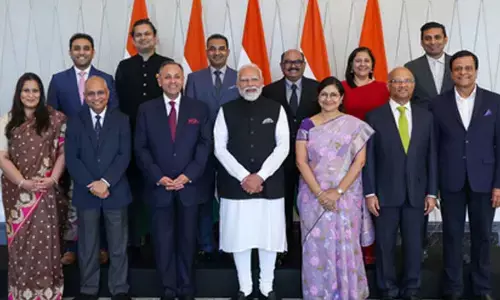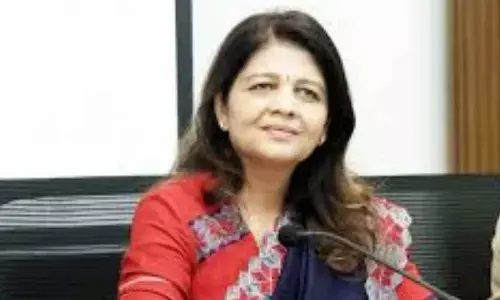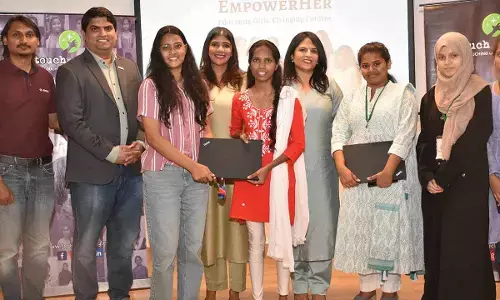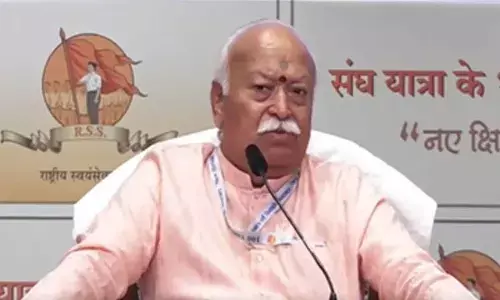Earth-friendly goals on ramp
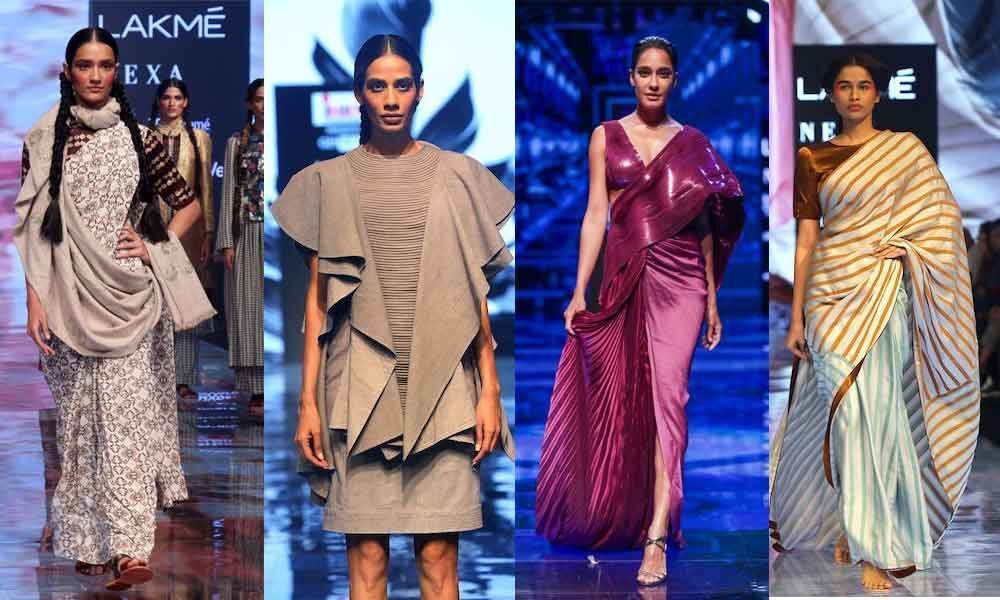
On Day 1 at the LFW Winter/ Festive 2019, Amit Aggarwal set an exciting pace on the ramp with his opulent designs in bright colours using the free flow fabric, which is drawn out of Reliance’s range of sustainable, performance enhanced, specially engineered fabric innovation portfolio Elan.
On Day 1 at the LFW Winter/ Festive 2019, Amit Aggarwal set an exciting pace on the ramp with his opulent designs in bright colours using the free flow fabric, which is drawn out of Reliance's range of sustainable, performance enhanced, specially engineered fabric innovation portfolio Elan.
Amit, who can be safely termed as a forerunner in reusable material used to fashion has found a liking for the fabric, and says, "The fabric not only enhances the aesthetics of the design through its elegant, fluid drapes but also sparks creative explorations for beautiful, feminine silhouettes."
To begin with it was polymer strips and geometric compositions in abundance om the ramp; Women's wear was opulent with polymer strips for long-sleeved mini, sheer skirt over body suit, pleated long gown and draped neo sari.
Men's wear was as adventurous and matched the polymer strip detailing also seen on battle jackets, plisséd one-sleeve shirt, boxy oversized trench coat and waist coat with shirt.
Amit's futuristic designs never falter, and there they were complementing the dramatic fine draping, the 3D embroidery, the shimmers, shoulder trails and bright colours including bright emerald, petrol, purple and plum, balanced with gold, blush, silver and ivory creating the look for what he calls his 'Flux' collection.
Lisa Haydons shayed down the ramp in a purple draped sari gown with micro plissé pallav and high slit skirt.
Keeping her dashing company on the ramp was ace cricketer Hardik Pandya who strutted down in a matching purple neo style, long-line, jacket teamed with narrow pants and shimmering flap detailing.
Young designers presented by INIFD, who opened the Lakmé Fashion Week set the tone for Gen Next, who showcased a strong leaning towards age-old crafts and traditional textile artisans.
Bold silhouettes with Khadi
Kolkata-based Gaurav Singh's 'Anatomy' label had an unconventional design sensibility.
His line of soft flowing but bold silhouettes with amazing drapes and dynamic curves, displayed extreme construction, and handwoven Khadi was his medium where the fabric molded perfectly to his creativity where he pushed the draping, layering and boning techniques to the ultimate limits for each garment on the ramp.
Vegan Silk
'The Little Things Studio' by Ankita Srivastava from New Delhi used new fabric Cupro, which is vegan silk and a by-product of cotton that is breathable, anti-static and bio-degradable along with Mashru, Modal silk from Gujarat and handloom Chanderi; her "Not so Perfect" was aimed at the sartorial requirements of diverse women that told a story with prints.
Zero Wastage
Akanksha Aggarwal's "Noié Noéi" concentrated on zero wastage. The collection on the ramp was a fashionable study of contrasts as unconventional volumes and eccentric silhouettes were balanced with imaginative details and amazing intelligent fabrications.
Inspired by architecture and colour the garments revealed multiple lines and patterns with diverse shapes.
Ode to artisans
Manjushree Saikia's label 'Ura Maku' unveiled her "Dawn to Reality" collection that was a fashionable amalgamation of timeless silhouettes and handmade textiles.
Her sharply cut three-piece suits were visualised in fabrics that comprised tea dyed mulberry Eri and Muga silk, as well as cotton/organic cotton and Chanderi. Her aim was to honour the handmade textile artisans and promote the glory of Indian textiles through her fashion directions.
Beauty of Ladakh
The 'Zilzom' label by Stanzin Palmo was a poetic fashionable offering inspired by the beauty of Ladakh. New-Delhi based NIFT graduate, Stanzin added to her design skills by working with Sonal Verma of Rara Avis, Looms of Ladakh and Supreme Overseas.
For her collection called "Between the Earth and Sky", Stanzin used the Apricot blossom and Sea Buckthorn as her design inspirations, Stanzin brought in hints of oriental details and then worked with digital art and thread work.
Her fabrics were obviously handmade Ladakh pashmina, Ladakh wool, silk, cotton, linen and rayon. The silhouettes were feminine and fluid but the base was the Ladakhi traditional dress called the 'Goncha', which featured gathers and wraps as the basis of construction.
Lakmé Official Makeup Expert at Lakmé Fashion Week Winter/Festive 2019, Namrata Soni for GenNext designer, Ura Maku created a look that was all about bold brows and a defined contour.
The eyes were framed with mascara and the lips were kept nude with the Lakmé Absolute Matte Revolution Lipstick in the shade Brazen Caramel. For the GenNext Designer, Little Things Studio show the beauty look was in line with the neon trend!
A bold orange neon blush ending right below the eyebrow. The eyes were kept simple with mascara and a bold brow. The look was tied together with the Lakmé Absolute Matte Revolution Lipstick in shade Mauve Mania.
Gen Next on Road
In order to promote the new batch of Gen Next designers each season, the platform has collaborated with three multi designer stores, which includes Anahita in Hyderabad.
Weaves of India
Antar Agni by Ujjawal Dubey had a grand offering of unisex clothing for men and women. Her "Masira" collection with inspirations from the works of Ethiopian artist Dawit Abebe, whose paintings and graphic colours also had explicit native influences.
She used a vast rich selection of fabrics that had hand woven Khes from Punjab, detailed Shibori, tie-dye from Churu in Rajasthan and then chose Maheshwari silks form Maheshwar.
There was also hand-woven Khadi from the Women Weave that supports and empowers women artisans in Madhya Pradesh.
There was impressive symmetry in Urvashi's engineered silhouettes. Multiple panels were balanced with seams and woven stripes. Her leitmotif has always been intricate hand pleating, which was creatively seen on natural textiles along with Kantha work.
Organic Fashion
Maku, Padmaja And Soham Dave unveiled organic fashion at the LFW on Day 2.
Maku Textiles have always paid homage to nature, craft and tradition.
The brand showcased its collection "Be There" that made a strong case to preserve the nearly extinct wild creatures on land and in the sea. Each garment was named after critically endangered species like Po'ouli, Pangolin, Dhole, Dugong, Baiji and Shika.
The garments had the relaxed easy silhouettes that Maku is renowned for.
And for both men's and women's collection the fabrics were restricted to jamdaani and Khadi in dark hues of stark black with hints of pencil stripes or tiny motifs.
Padmaja's collections have always had a fashionable organic feel that has appealed to lovers of eco-friendly attire. Her collection "Ayahuma" celebrated the beauty of festivals, rituals and dances with its delicate and relaxed silhouettes.
Inspired solely by nature, colours were drawn from natural tones of flowers, fruits, minerals and elements that showered the textiles in subtle shades and the designer's fabric choice too remained pure as her design team worked with the best weavers and dyers from India.
Soham Dave has always walked the sustainable road ever since he started his label in 2011. For LFW Winter/Festive 2019 he brought the glitter of gold and silver on his collection called "Zari".
Ensuring that his design sensibilities are intact, Soham used especially hand-woven fabrics that were created with the available resources for silk and cotton or silk with zari.
Always promoting artisan clusters for his collections, Soham had the expert weavers from the Fulia cluster in West Bengal to dream up the finest fabrics.
- Features Desk









